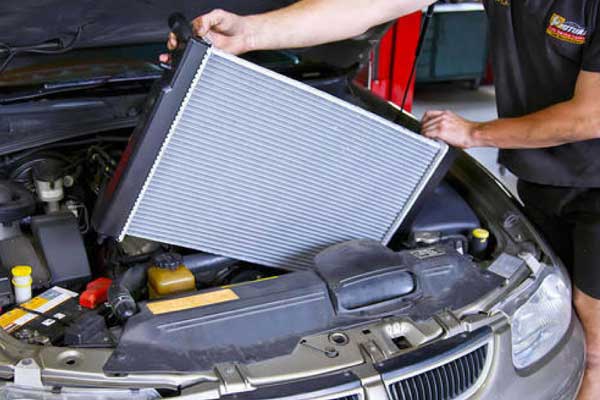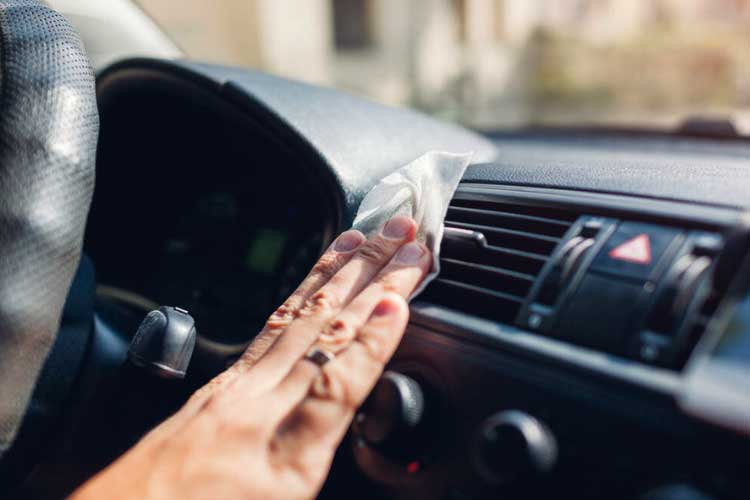When driving on a hot high-traffic day, there’s nothing better than activating the AC and cooling yourself down. However, sometimes this moment is short-lived when you notice your temperature gauge rising. With many questions, you can’t help but turn the AC off.
But why does a car overheat when AC is on and idle? A faulty radiator, cooling fans, or fault in the cooling system are the primary causes of a car overheating when the AC is on or idle. This happens because of a bad AC compressor or a temperature sensor.
The article covers all the information on why a vehicle might be overheating when idling with the air conditioner active. Read on to learn the causes and possible ways to solve this problem.
What Causes Car to Overheat When AC is on And Idling?
When the mixture of fuel and air burns during the compression stroke, the engine becomes very hot. Fans, cooling systems, and sensors monitor cool down the engine to prevent this overheating.
However, you might notice the temperature gauge rising when idling with the air conditioner on. Unlike the usual overheating problems, this problem has two possible causes, idling and the active air conditioner.

You can opt to diagnose each problem separately for a better chance of success. However, the following table covers some of the common causes of car overheating problems while idling with the air conditioner active.
| Causes | Solutions |
| Faulty fan | Repair or replace the fan |
| Faulty Coolant sensor | Replace the coolant sensor |
| Radiator problems | Repair the failing parts or replace |
| Faulty Cooling system | Repair the faulty parts |
| Faulty Ac compressor | Replace the failing parts |

The following parts cover the points in the table in-depth.
1. Fan Problems
The fans in the car are responsible for providing air to the cooling system and the air conditioner when needed. If they’re not working, the engine might survive on the air passing through when the car is moving.
However, the car’s engine can overheat when idling and with the extra demand from the air conditioner. The car’s radiator fan’s relay or switch might be faulty, causing the fan not to work.
Thus, the relay can burn due to coil overvoltage and cannot turn the fan on. The fan’s switch can stop working due to a blown-out fuse or broken wire.

Solution
A driver with a car overheating at idle problem on Reddit solved his problem by replacing the radiator fan. However, if you can fix the malfunctioning part, you can repair it instead of replacing it.
2. Faulty Sensor
Since the coolant sensor signals the fans when the engine is warming, you should check it after diagnosing the fans. The sensor cannot signal for the fans when the air conditioner runs if it is faulty. Likewise, sensor faults can develop from a poor connection interrupting the signal sent to the PCM.

Solution
Replace the failing coolant sensor with a new piece. This can cost between $250 and $400.
3. Radiator Problem
The car’s radiator is responsible for cooling the coolant returning from the engine. It also maintains proper pressure within the cooling system, a task handled by the radiator cap. Following are the ways the radiator can cause overheating when the vehicle is idle with the air conditioner on.
- Blocked Radiator fins
If the fins on the radiator have dust and debris, the coolant passing through cannot cool well, especially when idling. However, when the car is mobile, it might generate enough airflow to keep the fins cool.
- Radiator Cap Has Problems
If the radiator cap is faulty, it cannot maintain enough pressure in the cooling system. With the vehicle idling and the air conditioner running, the demand for cooling is high. Without enough pressure, the cooling is inefficient.

Solution
Clean the radiator with a pressured hose and blow the fins to remove dust and debris. Replace the faulty radiator cap with a new one and adjust accordingly after refilling the coolant.
You can also consider replacing the radiator because a person with the problem said the issue was solved after replacing the radiator.
4. Cooling System Fault
The cooling system is the next possible cause of the overheating problem since it’s responsible for cooling the engine down. When the vehicle is idling and the air conditioner is on, the demand for cooling is high. With a faulty cooling system, the engine will likely overheat.

Following are the ways a faulty cooling system contributes to the overheating problem.
- Low Coolant Levels
An inadequate amount of coolant is known to cause most overheating problems in engines. With the levels low, the coolant-to-metal contact is less, and the engine is not cooled enough. With the AC demanding more from the engine, it can overheat.
- Air Pockets in The Coolant
Air pockets or bubbles in the engine area are caused by inadequate pressure in the coolant. The bubbles harbor hot air, which is then transferred to the coolant and the engine heating it.
- Leakages
A leaking hose cannot carry the right amount of coolant needed by the engine. Therefore, the engine struggles to cool and overheats more often.
Solution
Check for leakages on the hose or near the carburetor and replace it if it’s leaking. If your coolant has air pockets, breed the air out by warming the engine and opening the radiator cap.
5. Fault in The AC Compressor
The air compressor converts the low-pressure refrigerant into high-pressure and circulates it through the system. The compressor uses power from the engine for this process.
If the compressor is malfunctioning, it can strain the engine by demanding too much power, causing it to overheat. The compressor belt, which transfers power from the engine to the compressor, might also be worn out.

Solution
Replace the compressor belt with a new one, which with labor cost included, it can cost between $150 and $250. If you suspect the compressor is causing the problem, get a professional to replace it.
How Do You Diagnose a Car That Overheats When Idling and AC on?

Diagnosing the car with the problem will help you determine the cause of the problem. Since the vehicle has a problem when the AC is active and idling, perform several experiments accordingly,
- Observe the engine temperature with AC off when idling and while on and driving. The experiment will help you determine the cause of overheating between the engine idling and the air conditioner.
- If the problems seem more on idling, check the fans and test them with your car’s battery.
- Also, check for leakages on the hose and use a block tester to check for air bubbles in the coolant.
- Observe the engine RPM when the air conditioner is active while the vehicle is moving and when stopped. If the RPM increases, the Ac compressor might be faulty.
It’s best to start your diagnosis with the cheapest solutions and advance to the more expensive ones. With this strategy, you’re less likely to waste money on the wrong repairs.

Tips To Prevent the Vehicle from Overheating When Idling and AC on
Like any other overheating problem, the idling and active AC problem consumes time and money. To help you evade this adversity, consider the following tips.
- Frequently service your cooling system and keep an eye out for leakages
- Clean the radiator as frequently as possible to avoid clogging
- Regularly check the coolant level in the cooling system
- Check for the condition of the coolant in case there are air pockets
- Occasionally check if the radiator fans run when the engine starts or shortly after
- Check AC belts during service
- Service the aircon compressors once every few years

FAQs
The following section has three frequently asked questions related to car overheating when idling with AC on.
Whether your car overheats due to a faulty fan or clogged radiator, the movement provides enough airflow to cool it. When idling, the vehicle doesn’t have enough air flowing through it, hence overheating.
To repair your overheating vehicle, expect to pay between $100 and $2000. The cost depends on the price of the faulty parts and also the labor cost.
Yes. Air conditioners cause engines to overheat. The air conditioner’s compressor connects to the engine, which affects its performance. If the compressor malfunctions, it can strain the engine and cause it to overheat.
Bottom Line
When more than two things cause your car to overheat, diagnosing the problem can get complicated. However, the article helps point out possible causes so you know which ones to look at first. Also, with the solutions, you know which steps to take after learning the cause.
You can diagnose the vehicle using the provided tips or get a professional to do it for you. While prevention is better than cure, observe the preventive tips to avoid the problem. However, with the article’s aid, you have the upper hand on this issue.
